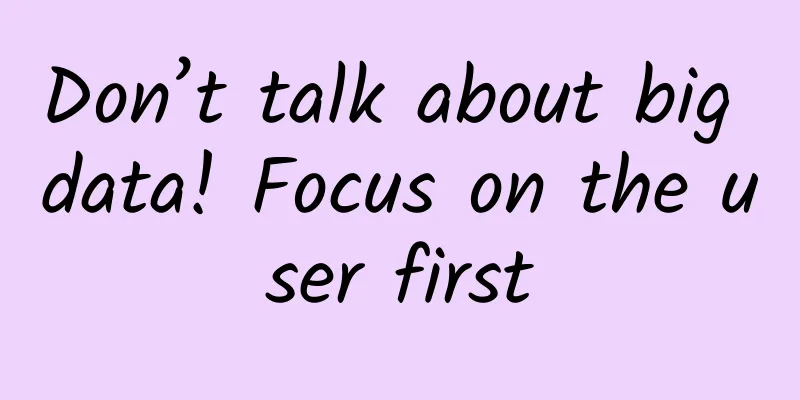Don’t talk about big data! Focus on the user first

|
Big data is very popular. Dan Ariely, founder of TED, joked: Big data is like teenagers talking about sex. Everyone is talking about it, but no one knows who is doing it. Everyone thinks someone else is doing it, so everyone claims to be doing it... This is a joke, but it reveals the truth. Not many companies are doing big data. What is certain is that everyone is eager to try. Big data is more than just a hype concept. There are already many successful cases of big data applications, such as Baidu's prediction of tourist attraction traffic and comfort level; Taobao's personalized shopping recommendations; and Xiaomi's 100,000-person Internet development team, and so on. Big data is beautiful and is the direction of progress. "The essence of big data is to restore the real needs of users," said Che Pinjue, chairman of the Alibaba Group Data Committee. Those companies that are eager to try should first ask themselves this question: Do I really care about the real needs of users? Don't rush to answer with the slogans on the wall, first check whether your company has the following four situations: First, when it comes to KPIs, management sees KPIs as a lifeline, and decomposition and assessment become their main tasks. Regardless of whether the KPI decomposition is reasonable, they do not work with their subordinates to find ways to achieve KPIs, do not track execution, and even condone the water in KPIs. Employees see KPIs as a baton, and work hard on KPI-related tasks, but can be perfunctory about other things. They are willing to deceive users for the sake of KPIs. Second, facing the leader, employees regard listening to the leader as the best execution, and the leader also understands execution in this way. The work assigned by the leader must be the most important and urgent, and it is given priority. The only reason for doing or not doing something is whether the leader arranges it. Third, they are self-centered and put aside their own department and their own responsibilities in everything. In front of users and colleagues, their mantras are "This is not my responsibility" and "I don't know about this." Fourth, facing the system, when users come to consult or complain, the answer is always "the company's system". There is no communication, no seeking truth from facts, and the company's rules and regulations are imposed on users. The original intention of the company's system is to prevent users and employees from taking advantage of loopholes; employees firmly believe that no matter what, they and users must not violate the company's system. Facing KPI, facing leaders, facing oneself, facing the system, all facing away from users, can you focus on user needs? Let’s not talk about big data first, let’s face users first. Big data is not omnipotent. For enterprises that do not pay attention to user needs, no matter how well they apply big data, it will be useless - of course, it is impossible to do it well. Facing the users, even without big data, we can understand their needs. There are many ways to collect user needs. Questionnaires and focus groups are traditional and effective ways to understand user needs. Questionnaires are standardized, structured, and have a wide coverage, and can produce specific quantitative results. Focus groups, on the other hand, are open and free, with in-depth and full communication. They require professional observation and record-keeping, and the conclusions they draw are perceptual rather than quantitative. Whether it is a questionnaire or a focus group, they all follow the mass line, go to the users, listen to their opinions and suggestions, and ensure that products and solutions come from the users. It should not be overlooked that the user hotline is also a good way to listen to users. Whether it is a complaint or an inquiry, it is an expression of the users' true opinions. Facing the user, even without big data, you can still make good products and services. Haidilao Hotpot is a good example. Haidilao wins in the catering industry where service quality is generally low by providing "abnormal" service. It treats employees well, empowers employees, satisfies employees, liberates employees' brains, allows employees to burst out with innovative vitality, and allows employees to provide good services to users from the heart. Of course, big data can also be used for Haidilao's decision-making reference or marketing activity evaluation, which is not contradictory. Big data should be used only when we cannot understand user needs and improve user experience with traditional methods. On the one hand, if market research and user experience have never been done, it means that there is no awareness of user needs at all. Without this awareness, it is a waste to do big data. On the other hand, whether it is modeling or the final application of results, big data needs to be combined with field research and experience with users. Big data is great. For companies that focus on user needs, big data can give them more power, better grasp user needs, and improve user experience. For companies that do not pay attention to user needs, and those that have the desire to pay attention to user needs but fail to really pay attention to user needs because they are facing KPI, leaders, themselves, and systems, it is better to turn around and face the users first! Face the users, get the most real demand information from the users, and gain recognition and strength from the users. Face the users, even without big data, you can understand user needs and make good products and services. When companies and employees face the users and establish the awareness of paying attention to user needs and improving user experience, it is not too late to do big data. As a winner of Toutiao's Qingyun Plan and Baijiahao's Bai+ Plan, the 2019 Baidu Digital Author of the Year, the Baijiahao's Most Popular Author in the Technology Field, the 2019 Sogou Technology and Culture Author, and the 2021 Baijiahao Quarterly Influential Creator, he has won many awards, including the 2013 Sohu Best Industry Media Person, the 2015 China New Media Entrepreneurship Competition Beijing Third Place, the 2015 Guangmang Experience Award, the 2015 China New Media Entrepreneurship Competition Finals Third Place, and the 2018 Baidu Dynamic Annual Powerful Celebrity. |
<<: New Gaode seeks change in "slimming down" by going O2O and commercializing
>>: The logic of the young LeTV TV super TV: products and users are together
Recommend
How to promote Xiaohongshu more effectively? Xiaohongshu promotion methods!
Xiaohongshu is known as the "overseas shoppi...
5 key points to build a private domain community from 0-1
Nowadays, private domain operations have graduall...
Write a good product promotion plan, only these 6 tips
I have no idea how to promote a new product every...
Tao Xiaotu Alliance "Short Video Shooting and Editing Skills"
Course Contents: 1. Introduction.mp4 2. How to ope...
2020 Tesla Impact Report
Tesla's 2020 Annual Impact Report shows that ...
The Double Eleven War is about to start. What are the routines and methods of JD.com and Alibaba?
While waiting for the arrival of this year’s Doub...
Marketing analysis: Xi'an bowl-breaking wine becomes popular with monthly income of over 100,000 yuan
As the name suggests, breaking the bowl of wine m...
Uncover the 6 core skills of "social marketing"
If there is any low-cost and high-conversion oper...
Chengdu tea friends share resources, personal resources are worth collecting
Chengdu tea lovers resource sharing appointment a...
WeChat mini-program games are very popular. What scenarios are they not suitable for at this stage?
Recently, WeChat Mini Programs have once again ma...
Warning! =͟͟͞10=͟͟͞͞Level=͟͟͞͞Thunder=͟͟͞͞Storm=͟͟͞͞Strong=͟͟͞͞wind will affect 9 provinces! How to deal with severe convective weather?
Heavy rainfall will continue today and tomorrow (...
2015 Spring Festival Homecoming High-end App Recommendation
As a young man who was born in a small town and w...
What should I do if I can’t write good short video copy? How to write short video copy?
After the rise of short videos , whether it is fo...
【Luban No. 7 3.0】Permanent version of short video transfer software (breaking through technical barriers and crushing all transfer tools)
【Luban No. 7 3.0】Short video permanent version of...









